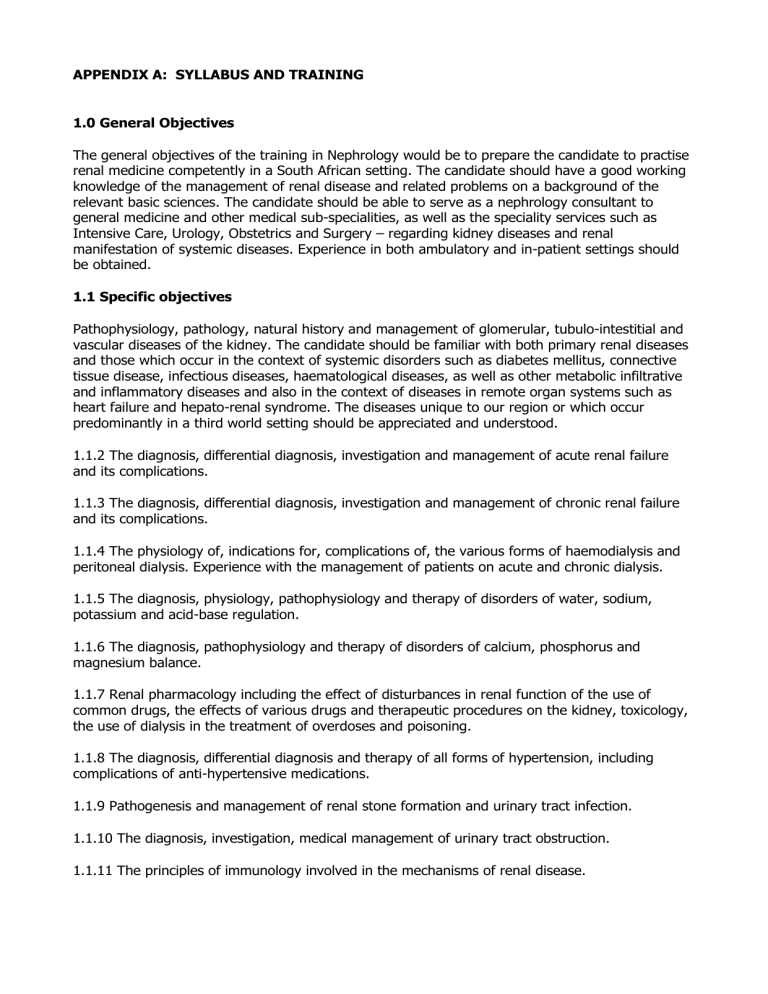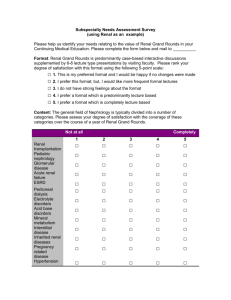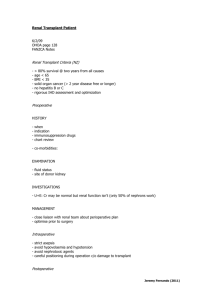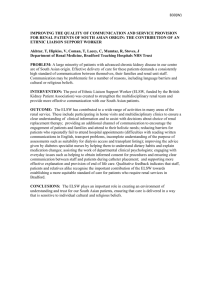Appendix A - South African Renal Society

APPENDIX A: SYLLABUS AND TRAINING
1.0 General Objectives
The general objectives of the training in Nephrology would be to prepare the candidate to practise renal medicine competently in a South African setting. The candidate should have a good working knowledge of the management of renal disease and related problems on a background of the relevant basic sciences. The candidate should be able to serve as a nephrology consultant to general medicine and other medical sub-specialities, as well as the speciality services such as
Intensive Care, Urology, Obstetrics and Surgery – regarding kidney diseases and renal manifestation of systemic diseases. Experience in both ambulatory and in-patient settings should be obtained.
1.1 Specific objectives
Pathophysiology, pathology, natural history and management of glomerular, tubulo-intestitial and vascular diseases of the kidney. The candidate should be familiar with both primary renal diseases and those which occur in the context of systemic disorders such as diabetes mellitus, connective tissue disease, infectious diseases, haematological diseases, as well as other metabolic infiltrative and inflammatory diseases and also in the context of diseases in remote organ systems such as heart failure and hepato-renal syndrome. The diseases unique to our region or which occur predominantly in a third world setting should be appreciated and understood.
1.1.2 The diagnosis, differential diagnosis, investigation and management of acute renal failure and its complications.
1.1.3 The diagnosis, differential diagnosis, investigation and management of chronic renal failure and its complications.
1.1.4 The physiology of, indications for, complications of, the various forms of haemodialysis and peritoneal dialysis. Experience with the management of patients on acute and chronic dialysis.
1.1.5 The diagnosis, physiology, pathophysiology and therapy of disorders of water, sodium, potassium and acid-base regulation.
1.1.6 The diagnosis, pathophysiology and therapy of disorders of calcium, phosphorus and magnesium balance.
1.1.7 Renal pharmacology including the effect of disturbances in renal function of the use of common drugs, the effects of various drugs and therapeutic procedures on the kidney, toxicology, the use of dialysis in the treatment of overdoses and poisoning.
1.1.8 The diagnosis, differential diagnosis and therapy of all forms of hypertension, including complications of anti-hypertensive medications.
1.1.9 Pathogenesis and management of renal stone formation and urinary tract infection.
1.1.10 The diagnosis, investigation, medical management of urinary tract obstruction.
1.1.11 The principles of immunology involved in the mechanisms of renal disease.
1.1.12 The management of renal transplant, including understanding of the donor and the recipient’s selection, histocompatibility typing, mechanisms of rejection and management of immunosuppression and its complications.
1.1.13 Genetics, cell biology and molecular medicine as applicable to renal disease.
1.1.14 Ethical issues related to the practise of renal medicine in South Africa and the African continent.
1.2 Additional skills
Candidates would be expected to develop the following skills:
1.2.1 Urinalysis including examination of the urine sediment.
1.2.2 The performance and interpretation of the renal function tests.
1.2.3 Interpretation of radiological, radio-isotopic and ultrasound examination of the urinary tract.
1.2.4 Performance of renal biopsies, including indications, preparation and complications.
1.2.5 Interpretation of basic renal histopathology.
1.2.6 The ability to establish access for acute dialysis.
1.2.7 Critical appraisal of scientific publications, including basic research, pertinent nephrology.
1.2.8 Manage other staff working in a renal unit in a team fashion.
1.2.9 Basic administrative skill required in the management of dialysis unit and renal patients.
1.2.10 Be able to do basic costing and cost analysis in the treatment of patients with renal disease.
1.2.11 Be able to identify the problems unique to practising renal medicine in a developing country.
1.2.12 Understand the principles of scientific research and be able to write a basic research protocol, as well as be able to conduct a scientific study.
1.2.13 Active participation in relevant:
(i) Congresses
(ii) Organised CME’s
(iii) Academic meetings






